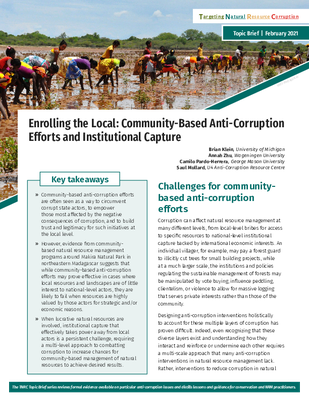Enrolling the Local: Community-Based Anti-Corruption Efforts and Institutional Capture

Author(s): Klein, Brian; Zhu, Annah; Pardo-Herrera, Camilo; Mullard, Saul
Publication Date: 2021
DOWNLOAD FILEThis Brief examines community-based anti-corruption efforts in natural resource management in order to better understand their rationales, potentialities, and challenges—especially complications posed by the intersection of such initiatives with national-level dynamics of institutional capture.
The authors present a case study from northeastern Madagascar in order to empirically explore such dynamics, and conclude with a discussion of how multi-level anti-corruption interventions might offer a promising way forward for reducing corruption in natural resource management for certain high-value landscapes or resources that might be subject to challenges connected to institutional capture.
Key Takeaways:
- Community-based anti-corruption efforts are often seen as a way to circumvent corrupt state actors, to empower those most affected by the negative consequences of corruption, and to build trust and legitimacy for such initiatives at the local level.
- However, evidence from community-based natural resource management programs around Makira Natural Park in northeastern Madagascar suggests that while community-based anti-corruption efforts may prove effective in cases where local resources and landscapes are of little interest to national-level actors, they are likely to fail when resources are highly valued by those actors for strategic and/or economic reasons.
- When lucrative natural resources are involved, institutional capture that effectively takes power away from local actors is a persistent challenge, requiring a multi-level approach to combatting corruption to increase chances for community-based management of natural resources to achieve desired results.


